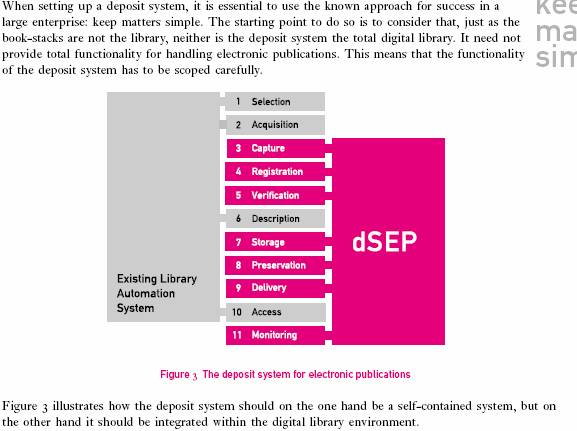 |
 |
|
Workshop D Tanja Buzina, Sonja Pigac, Mirna Willer (National and University Library, Zagreb, Croatia) Miroslav Milinović, Nebojša Topolšćak ( University Computing Centre – SRCE, Croatia): Towards the hybrid library integrating information library system and digital archive issues in archiving web resources for a National Library and beyond The title of the workshop and its starting point is Chris Rusbridge's definition of the “hybrid library” published in D-Lib Magazine in July/August 1998 issue. We cite: “The hybrid library was designed to bring a range of technologies from different sources together in the context of a working library, and also to begin to explore integrated systems and services in both the electronic and print environments. The hybrid library should integrate access to all four different kinds of resources identified above, using different technologies from the digital library world, and across different media. The name hybrid library is intended to reflect the transitional state of the library, which today can neither be fully print nor fully digital. As we have seen, in so many cases the results of adding technology piece-meal are unsatisfactory. The hybrid library tries to use the technologies available to bring things together into a library reflecting the best of both worlds.” The conceptual model for realizing “a working library” is found in the NEDLIB project, more particularly in the Project's conclusion as to the setting up a deposit system. Johan Steenbackkers wrote:
The concept of the hybrid library and the NEDLIB model functioned as a basis for the project started by the National and University Library and University of Zagreb Computer Centre , Croatia with the aim of building a digital archive for deposit copies of Croatian web publications. The Project Designing the System for Capturing and Archiving Deposit Copies of Croatian Web Publications started in November 2003 and finished in November 2004, with the following results and recommendations for its continuation. The results: development of the digital archive system DAMP (Digitalni Arhiv Mrežnih Publikacija); integration of the ILS CROLIST and DAMP (NUL's catalogue and digital archive); definition of the business process model for identification, selection, cataloguing (bibliographic control), capturing, archiving, delivery and access, and quality and authenticity monitoring; analysis of completeness and successfulness of the archiving process in relation to specificities of web technologies and (non)standards for producing publications, and functionality of digital archive itself. Recommendations: implementation of the Project's model into the NUL's workflow for processing library material; investigate legislation in relation to capturing, archiving and giving access to archived material; investigate the way to integrate archiving system within the cooperative cataloguing programme and union catalogue; investigate the cooperation, standards and guidelines for the production of web publications, as well as models of delivery of publications with publishers; define the second phase of the Project as to development of the user interface, capturing, archiving and giving access to protected publications by means of authentication/authorization mechanisms, more detailed diagnostics and statistical analysis of archived content with the aim of improving long term preservation of resources. In the first part of the workshop demonstration of the system's functionality will be given and open issues discussed. Second part of the workshop is designed to be more technical, oriented towards internals of the DAMP system. Internal architecture of the DAMP system will be explained. We will present, on real-life examples, how to efficiently use DAMP making sure that specific web sites with distinctive use of web technologies are properly archived. Finally the limits and open problems in use of the DAMP will be discussed. Level of potential audience: the knowledge of/familiarity with web technology and/or library processing of web resources, system librarians. Four-hour workshop. |
Last revised: June 12th 2005. |
